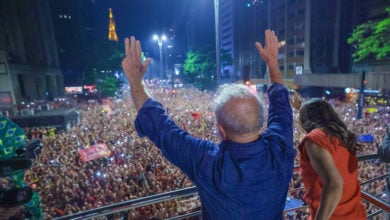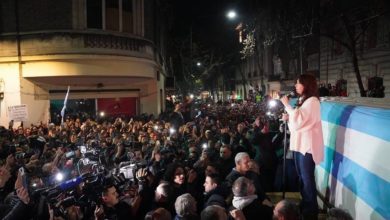The Dec. 6 regional elections for governors in France resulted in a victory for the fascist National Front (FN) party, led by Marine Le Pen. With just under 30 percent of the vote, the FN came in first place in 6 of 13 regions and still managed to advance to the second round in several others. Already rising in popularity on the back of racist scapegoating targeting Muslims and immigrants, the FN cynically manipulated the terrorist attacks in Paris to win even more backing.
Despite their plurality of the vote, the FN is considered to have a good chance of ultimately winning only two governorships. However, this is still an unprecedented victory for a party once considered to be irredeemably outside the mainstream of French politics.
The Republicans, the center-right party of former President Nicholas Sarkozy, came in a close second at roughly 28 percent, followed by the governing Socialist Party at 23 percent. The Republicans are poised to win a large majority of governorships in the second round, which will be held this coming Sunday.
This dangerous breakthrough for the far right comes after years of relentless economic crisis and austerity. First under Sarkozy and then under Hollande, social programs and living standards for poor and working people were demolished under budget cuts and other measures.
There has been no real recovery from the 2008 economic crisis and the subsequent “European debt crisis” that has seen the single currency pushed to the brink. Official unemployment stands at 10.6 percent, rising to an eye-popping 24.7 percent among young people!
The French people have fought back with strikes, rallies, community-based resistance and other forms of struggle throughout these difficult years. The FN captured sectors of society that would otherwise support this progressive movement and redirected them towards a racist, reactionary agenda.
What is the National Front?
The National Front was founded in the early 1970s, inspired by far right forces in Italy and elsewhere that aimed to counter the growing revolutionary wave in European and world politics. Its historic leader is Jean-Marie Le Pen, father of current leader Marine Le Pen.
The FN promotes extreme versions of all the backwardness produced by capitalist society – anti-LGBTQ bigotry, sexism, racism and Islamophobia, to name a few. Jean-Marie Le Pen has infamously called the Nazi gas chambers of World War Two “a mere detail of history”. This is especially troubling given the history of the French right wing during the war. While some rallied around the anti-fascist Charles de Gaulle, others supported the collaborationist regime of Marshal Philippe Petain, which ruled the south of the country and was complicit in the holocaust.
Jean-Marie, however, has been pushed out of the party by Marine, who is the National Front’s presumptive nominee for the 2017 presidential election. The current FN leadership’s orientation is to present themselves as a force that will take on the establishment but still a viable choice to govern the country.
This does not mean that the organization has abandoned the fascist core of its politics – it has simply modified its outward presentation. A similar strategy was pursued by Ku Klux Klan leader David Duke in the 1990s in the United States.
On economic issues, the FN decries globalization and the decline of French industry in an appeal to sectors of society that previously enjoyed a relatively comfortable standard of living that is now vanishing.
The left aims to mobilize these sectors to struggle for unity and equality in the context of the overall movement for revolutionary change. The National Front, on the other hand, channels this strata’s frustration in a direction that bolsters the existing system. Immigrants, refugees, Muslims, Roma, Jews, LGBTQ people – anyone except the big banks and corporations are blamed for the dire situation facing the French people.
The FN has especially focused its hatred towards the country’s sizeable Muslim population, many of whom live in the country due to France’s brutal colonial legacy in Africa and the Middle East. Just like Donald Trump in the United States, Marine Le Pen and her colleagues have used the refugee crisis to further stir up Islamophobic bigotry.
The National Front opposes the European Union, but not from the pro-working class, internationalist position that motivates left-wing anti-EU forces. The FN postures as the defender of French national sovereignty, something that is in fact not under threat, in order to take advantage of popular frustration with the EU.
A dangerous new chapter in French politics
The National Front’s gains have sent the other major political forces scrambling. In general, there has been a drift to the right.
This has even effected the nominally left-wing Socialist Party, which was swept into power in 2012 but rapidly become highly unpopular. To turn things around for the government, last year President Francois Hollande appointed Manuel Valls to be Prime Minister. Valls had previously been the Interior Minister, where he earned a reputation as an anti-immigrant racist. Defending his policy of dismantling communities set up by the long-persecuted Roma people, Valls said in 2013, “The majority should be delivered back to the borders. We are not here to welcome these people.”
In the wake of the horrific Paris attacks, the Socialist Party government is unleashing a wave of political repression. It has announced its intention to close up to 160 mosques across the country, and banned mass demonstrations under a state of emergency. This was used to prevent the huge actions that had been planned to coincide with the COP 21 climate summit.
The Left Front, an alliance of progressive and socialist groupings that includes the French Communist Party, was unable to achieve a breakthrough in the election. Its candidates generally received less than five percent of the vote, alongside several other smaller forces of the revolutionary left.
As basic democratic rights come under attack and the right wing surges, progressive people in France face the difficult task of building a fighting anti-fascist movement that can struggle for unity and solidarity. The appeal of the far right can only be undercut by a clearly-articulated left wing alternative that aims to take on both the National Front and the system itself.




